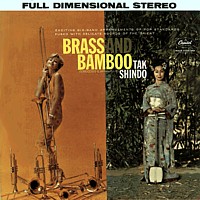Home · Listener's Guide · The Songs · Who's Who · Liner Notes · Selected Tracks · What's New · Search

Tak Shindo
- Born 29 December 1922, Sacramento, California
- Died 17 April 2002, San Dimas, California
 A bona fide musicologist by education, Tak Shindo was responsible for some of the more authentic uses of exotica instruments in exotica recordings.
A bona fide musicologist by education, Tak Shindo was responsible for some of the more authentic uses of exotica instruments in exotica recordings.
Shindo served in the U.S. Army Military Intelligence Service as a Japanese language instructor at Fort Snelling, Minnesota. After his discharge, he studied under the G.I. Bill at Los Angeles State College (now Cal State University, Los Angeles). After graduating with a bachelor's degree in music, he did graduate work at the University of Southern California over the course of the next decade, including study with the great film composer Miklos Rozsa, and eventually earned a masters degree.
Shindo's graduate work took that long because he was also working full time as a studio composer. He worked with most of the big television and movie studios of the time, including Columbia, 20th Century Fox, Warner Brothers, Desilu, Disney, NBC, and CBS. Among the shows he worked on were "Hawaiian Eye," "The Dinah Shore Show," "Gunsmoke," and "The Untouchables." While with CBS television, he penned the themes to "The Ed Sullivan Show," "Wagon Train," and "Adventure."
Shindo's albums for Capitol, Edison International, and Mercury all feature a mix of eastern and western musical styles and instrumentation. Most of them use a standard studio band with Oriental instrumentation, covering standard Western material such as "Caravan" and "Wagon Wheels." The novelty effect was perhaps shorter-lived than the caliber of craftmanship Shindo put into them deserved. Although most of his work on others' recordings went uncredited, his name does show up on two interesting albums: The Yellow Unicorn, which features Rod McKuen reciting his poems to a mix of Japanese and western instruments played by Shindo and Julie Meredith; and East Meets West, on which organist Paul Marks plays Japanese pop and folk songs on the Wurlitzer while Shindo provides suitable accompaniment on the koto and other Japanese instruments.
Shindo studied Japanese music extensively and was often tapped to score or provide incidental music for films dealing with Oriental subjects and settings, like Sayonara, Stop Over Tokyo, and Dawn of Asia. He collected Japanese instruments, wrote a history of Japanese music, and lectured extensively on Oriental music. In the mid-1960s, he joined the faculty of Cal State Los Angeles and left the studio system. He remained active in the Nisei veteran's organization, Go For Broke, and composed two pieces for the first anniversary celebration of the Go for Broke Monument in downtown Los Angeles in 2000.
Recordings
- Brass and Bamboo, Capitol ST-1345
- Accent on Bamboo, Capitol T-1433
- Tak Shindo Goes Western, Capitol LP
- Mgana! Primitive Sounds, Edison International 100
- Tak Shindo: Far East Goes Western, Mercury PPS 2031
- Rod McKuen, The Yellow Unicorn (with Japanese music by Shindo and Julie Meredith), Imperial LP 12036
- Paul Marks, East Meets West: Golden Melodies of Japan, Imperial LP 12057
Search for Records and CDs
New CDs from Amazon.com
Used Records and CDs from GEMM.com
S p a c e A g e P o p M u s i c
Home · Listener's Guide · The Songs · Who's Who · Liner Notes · Selected Tracks · What's New · Search
Email: editor@spaceagepop.com